CRM software is a technology that helps in automating business processes and enhancing customer experience. Marketing CRM software plays a key role in effective marketing. A good CRM software helps you to manage your sales team, customers and other business operations seamlessly.
In this article, you’ll find:
- Why Should You Considering Using A Marketing CRM?
- Marketing CRM vs Normal CRM: What’s the Difference?
- How We Chose the Best Marketing CRM Software?
- The Best Marketing CRMs
- The Conclusion
Why Should You Consider Using a Marketing CRM?
Using CRM in Your Business can Prove to be an Extremely Effective Way of Marketing.
Here are a few benefits that add to its importance:
Manage leads with no time wastage
With a CRM system, you can easily manage your leads by creating workflow processes, sending emails, making phone calls and updating the status of each lead in real-time. This will help you to focus on the task at hand without wasting your time on doing repetitive tasks like entering data manually into different systems.
Get insights into your customers
With the help of customer relationship management (CRM) software, you can get an insight into what your customers want and how they want it so that you can deliver it to them effectively and efficiently.
Stay organized
With an integrated CRM system, you can stay updated about every aspect of your business from sales to marketing, from leads to customers and from accounts receivable to human resources.
Marketing CRMs vs Normal CRMs: What’s the Difference?
The goal of a CRM system is to improve business relationships with customers, streamline processes, and increase profitability. It’s important to understand the types of CRM systems: marketing CRMs and normal CRMs.
Marketing CRMs, also known as Marketing Automation Systems, are a type of CRM that focuses specifically on the marketing aspects of customer relationship management. These systems are designed to help businesses automate and streamline their marketing efforts, including list building, email marketing, social media marketing, lead generation and other digital marketing activities. Marketing CRMs typically include features such as email campaign management, lead generation and tracking, and customer segmentation.
Normal CRMs, on the other hand, are more general purpose and are designed to help businesses manage customer relationships across all departments and functions, including sales, customer service, and support. These systems often include features such as contact management, opportunity management, and customer service tools.
In summary, the main difference between marketing CRMs and normal CRMs is the focus of the tool. Marketing CRMs are specifically designed for marketing activities, while normal CRMs are more general purpose and are designed to help businesses manage customer relationships across all departments and functions.
How We Chose the Best Marketing CRM Software?
To write a detailed and fair review of marketing CRM software, we followed a thorough research process using various sources. We looked at each software’s features, functions, and cost in great detail. We also read many industry reports, expert opinions, and user reviews to understand how people feel about these tools in real life.
We checked how easy the software is to use, how well it works with other tools, and if it can grow with a business. By cross-referencing all this information together, we’ve created a in-depth assessment of each of the marketing CRMs to help businesses choose the right marketing CRM software for their specific needs.

What We Looked for in the Marketing CRMs?
There are several factors to consider when choosing the best marketing CRM software for your business.
1. Features:
Make sure the CRM software has all the features you need to effectively manage your marketing campaigns, such as email marketing, social media integration, and lead tracking.
2. Ease of Use:
Look for a CRM that is intuitive and easy to use so that your team can quickly get up to speed and start using it effectively.
3. Integration with Other Tools:
Consider whether the CRM software integrates with other tools you use, such as email marketing software or social media platforms.
4. Scalability:
Choose a CRM that can grow with your business and handle an increasing volume of leads and customer data.
5. Price:
Determine your budget and look for a CRM that fits within it. Keep in mind that more expensive options may have more advanced features, but they may not be necessary for your needs.
6. Customer Support:
Look for a CRM that offers good customer support, including documentation, training, and support resources.
7. Reputation:
Read reviews and ask for recommendations from other businesses to get a sense of the CRM’s reputation and effectiveness.
It’s also a good idea to test out a few different CRM options before making a final decision. Many CRM vendors offer free trials or demos, which can give you a sense of how the software works and whether it’s a good fit for your business.
The Best Marketing CRMs
Thus, here we have shortlisted 9 best marketing CRM software and explained why they are the best ones in their respective categories!
- HubSpot : Best for Overall Usage
- Nutshell: Best CRM for email marketing
- Zoho: Best for personalized Lead Management
- Salesmate: Best for Sales Teams
- MailChimp: Best marketing CRM with free tools
- ActiveCampaign: Best for scaling market via automation
- Pipedrive: Best for activities that close deals
- Zendesk: Best for boosting conversions
- SugarCRM: Best for experienced users

As the proprietor of Festoon House, an outdoor LED fairy lights business, I’ve experimented with a variety of email marketing methods to help our brand. We generally use the tool to communicate with our clients, promote new products, and provide unique promotions.
This solution stands out for its user-friendly UI and extensive analytics, which enable us to effectively track open rates, click-through rates, and client engagement.
One area where this tool excels is in automation. We put up automated email sequences for new subscribers, abandoned cart notifications, and post-purchase follow-ups to save time while building client relationships.
When using this tool, consider segmenting your email lists depending on customer behavior and preferences. This allows you to personalize your messaging for optimum impact and relevancy.
While we are pleased with our present email marketing platform, we are constantly on the hunt for alternatives to ensure that we are using the greatest tools for our business needs.
However, we have yet to find a compelling reason to move because our existing solution fits our functional, user-friendly, and cost-effective needs. We believe in staying with what works until a superior choice emerges that provides considerable benefits to our business.
Matt Little, Director/Owner of Festoon House
Now let’s understand the CRMs in detail:
#1. HubSpot: Best Marketing CRM for Overall Use

HubSpot CRM is a customer relationship management (CRM) platform that helps businesses manage and analyze customer interactions and data throughout the customer journey.
With HubSpot CRM, businesses can store and organize customer information, track customer interactions and activity, and automate customer workflows and processes. Read our comprehensive HubSpot CRM review.
Features
HubSpot is the best marketing CRM for overall use. It’s not just for marketers, though. HubSpot can be used by anyone in your organization who needs to manage their relationships with prospects and customers.
HubSpot is also a great tool if you’re looking to get started with inbound marketing. The platform offers a ton of features that make it easy to create content, build websites, collect leads, and measure your results.
Some key features of HubSpot CRM include:
- Contact Management: Allows businesses to store and organize customer data, such as contact information, interactions, and notes.
- Lead Capture: Enables businesses to capture and manage leads from various sources, such as forms, website visitors, and social media.
- Email Integration: Allows businesses to send, track, and analyze email communications with customers.
- Sales Pipeline Management: Helps businesses track and manage sales opportunities and deals through the sales process.
- Marketing Automation: Enables businesses to automate marketing tasks, such as email campaigns and social media posting.
Pros and Cons
There are various pros and cons of using HubSpot marketing CRM software:
Pros:
Some prominent advantages of using this CRM software are:
Comprehensive Marketing Tools:
HubSpot offers a range of marketing tools, including email marketing, social media management, SEO, landing pages, and more. These tools can help you effectively manage your marketing efforts and reach your target audience.
Lead Generation and Management:
HubSpot has a number of features designed to help you generate and manage leads, including lead capture forms, lead scoring, and automated lead nurturing.
Analytics and Reporting:
HubSpot provides detailed analytics and reporting capabilities, allowing you to track the performance of your marketing campaigns and understand what’s working and what’s not.
Integration with Other Tools:
HubSpot integrates with a variety of other tools and platforms, such as Google Analytics, Salesforce, and LinkedIn, which can help you streamline your workflows and get a more complete picture of your marketing efforts.
Customer Support:
HubSpot offers a range of resources and support options, including a comprehensive knowledge base, live chat and email support, and training materials to help you get the most out of the platform.
Cons:
Some prominent disadvantages of using this CRM software are:
Cost:
HubSpot can be expensive for small businesses, especially if you need to use additional features such as Salesforce integration or custom reporting.
Learning Curve:
HubSpot has a lot of features and can be overwhelming for users who are new to CRM software. It may take some time to learn how to use all of the features effectively.
Limited Customization:
While HubSpot allows for some customization, it may not be as flexible as other CRM platforms when it comes to customizing fields, workflows, and other features.
Limited Integrations:
While HubSpot does offer integrations with many popular marketing and sales tools, it may not have integrations with all the tools you use.
Limited Reporting Capabilities:
While HubSpot does offer some reporting capabilities, it may not be as robust as other CRM platforms.
How to Make the Best Use of HubSpot CRM?
HubSpot is a comprehensive customer relationship management (CRM) platform that can help your business streamline and optimize your marketing efforts.
Here are some ways to make the best use of HubSpot’s marketing CRM software:
Integrate your customer data:
Use HubSpot’s CRM to centralize all of your customer data in one place. This includes contact information, sales data, and customer interactions.
Use marketing automation:
HubSpot’s marketing automation features allow you to create personalized email campaigns, social media posts, and other marketing materials based on specific triggers or customer behaviors.
Analyze and optimize your marketing efforts:
HubSpot’s CRM includes a range of analytics and reporting tools. Use these tools to identify areas of your marketing strategy that are working well and areas that need improvement.
Use the CRM to manage your sales efforts:
You can use the CRM to track deals, manage your sales pipeline, and collaborate with your sales team.
Pricing
The HubSpot CRM has the marketing hub which further provides various plans as stated below:
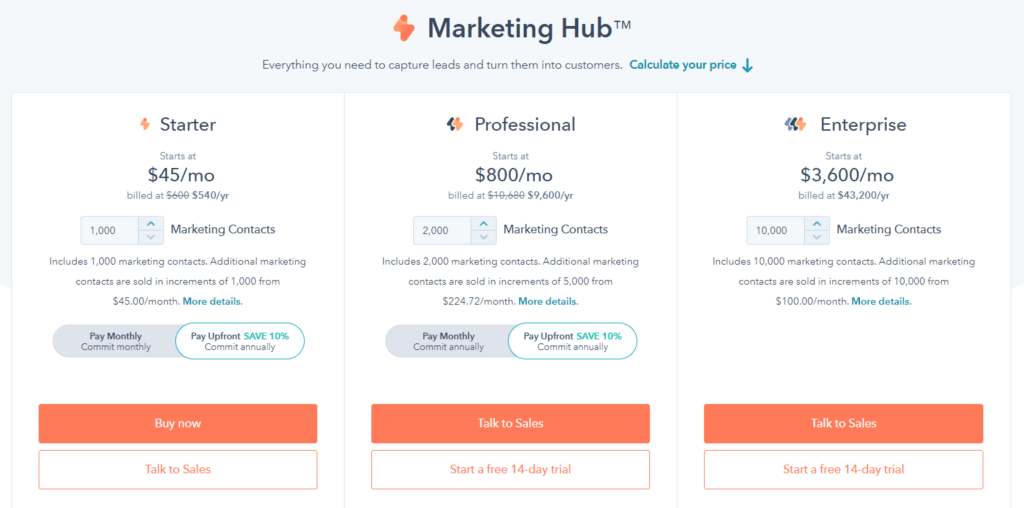
Free Plan:
The free plan offers basic features of HubSpot CRM. Some features offered by this plan are:
- A basic CRM with limited contact and lead management capabilities
- A contact list and a lead list that you can organize into groups, milestones, or campaigns
- Contact records with basic information (name, email address, phone number, social profiles)
- Lead records with basic information (name, email address, phone number)
Starters Plan:
It is designed for small businesses. The pricing starts at $45/mo. This plan offers contact management, marketing automation, analytics and reporting, lead capture forms and integrations with popular business tools.
Professional Plan:
It is designed for medium-sized businesses. The pricing starts at $800/mo. The plan includes all the features of the starters plan along with advanced tools for automation, integration, the ability to create and manage landing pages, and customer service tools such as live chat and chatbots.
Enterprise Plan:
It is designed for larger businesses. The pricing starts at $3,600/mo. This plan includes all the features of the professional plan along with advanced customer service tools, and lead management tools such as lead scoring and lead routing.
#2. Nutshell: Best for Email Marketing
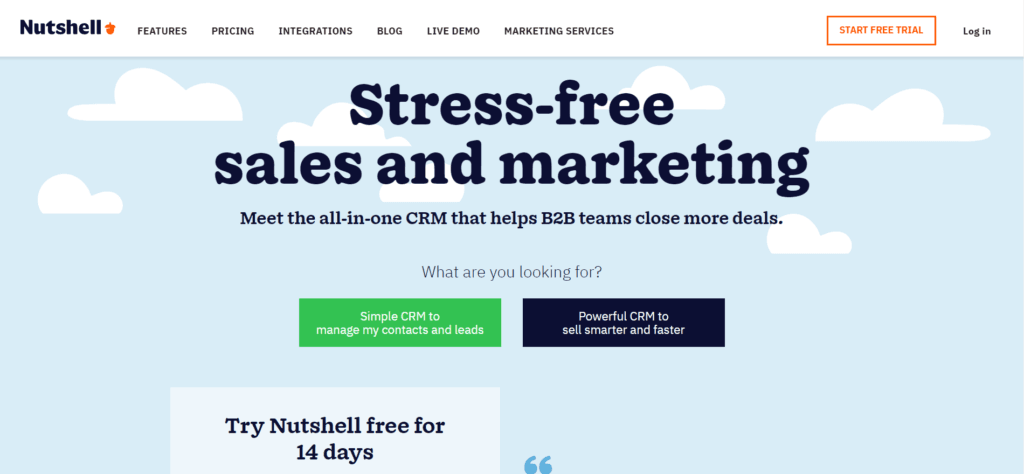
Nutshell is a customer relationship management (CRM) software that helps businesses manage and track customer interactions and data throughout the customer journey.
With Nutshell, businesses can store and organize customer information, track customer interactions and activity, and automate customer workflows and processes.
Features
Nutshell CRM is a comprehensive, cloud-based solution for managing sales pipeline, email marketing and customer service.
The CRM offers many features that are ideal for email marketing. For example, Nutshell CRM has built-in email marketing templates that can be customized to suit your brand’s needs. The templates also include a set of pre-written emails so you don’t have to spend time creating them from scratch. The templates can be previewed in the builder before sending them to your customers.
This CRM also has built-in tracking capabilities that allow you to see the number of times your message was opened and how many clicks it received. This information helps you determine which types of subject lines get more engagement from your audience and what types of calls to action work best for various audiences.
Some other key features of Nutshell include:
- Contact management: Allows businesses to store and organize data of customers and prospects, such as contact information, interactions, and enables you to take additional notes as well.
- Lead tracking: This feature helps track and manage leads from various sources, such as forms, website visitors, and social media.
- Sales pipeline management: This functionality allows you to track and manage sales opportunities and deals through the sales process.
- Marketing automation: This allows you to automate several marketing tasks that are repetitive in nature, such as setting up sequenced email drip campaigns and social media scheduling.
- Collaboration tools: Allows team members to collaborate and communicate with each other within the CRM platform.
Pros and Cons of Using Nutshell CRM Software
There are some considerable pros and cons that one must know about this marketing CRM software.
Pros:
There are various disadvantages of using the CRM software. These include:
Improved customer relationship management:
Nutshell’s CRM features allow businesses to track and manage customer interactions, such as phone calls, emails, and meetings, and keep all customer-related information in one place. This can help businesses build stronger, more meaningful relationships with their customers.
Enhanced sales productivity:
Nutshell’s sales tools, such as its lead management and sales forecasting features, can help businesses streamline their sales processes and increase productivity.
Greater visibility and insights:
Nutshell provides businesses with a comprehensive view of their customer relationships, which can help them better understand their customers’ needs and preferences. This can lead to more targeted marketing efforts and improved customer satisfaction.
Improved collaboration:
Nutshell’s collaboration features allow businesses to share customer information and collaborate on tasks with team members. This can help improve communication and coordination within the organization.
Customizable:
Nutshell offers a range of customizable features, such as the ability to create custom fields and tags, that allow businesses to tailor the software to their specific needs.
Cons:
There are various disadvantages of using the CRM software. These include:
Cost:
Nutshell is a paid software, so businesses will need to budget for the cost of using it. Prices can vary depending on the number of users and the specific features a business needs and the business goals and strategies.
Complexity:
Nutshell has a wide range of features, which can make it a more complex software to use. This may require businesses to invest in training or onboarding to ensure that team members are able to use the software effectively.
Limited integration with other software:
While Nutshell offers some integration with other software, such as Google Calendar and Mailchimp, the range of integrations may be more limited compared to other CRM software. This could be a drawback for businesses that rely on a range of other tools and want a more seamless integration between their systems.
Limited customer support:
Some users have reported limited customer support from Nutshell, with long wait times or difficulty reaching a representative when needed. This could be a problem for businesses that rely heavily on the software and need timely support.
Limited mobile app functionality:
While Nutshell does have a mobile app, it may not have all of the same features as the desktop version, which could be a limitation for businesses that need to access the software on the go.
How to Make the Best Use of Nutshell CRM?
Nutshell CRM is a powerful tool for managing your sales teams, but it can be tricky to get the most out of.
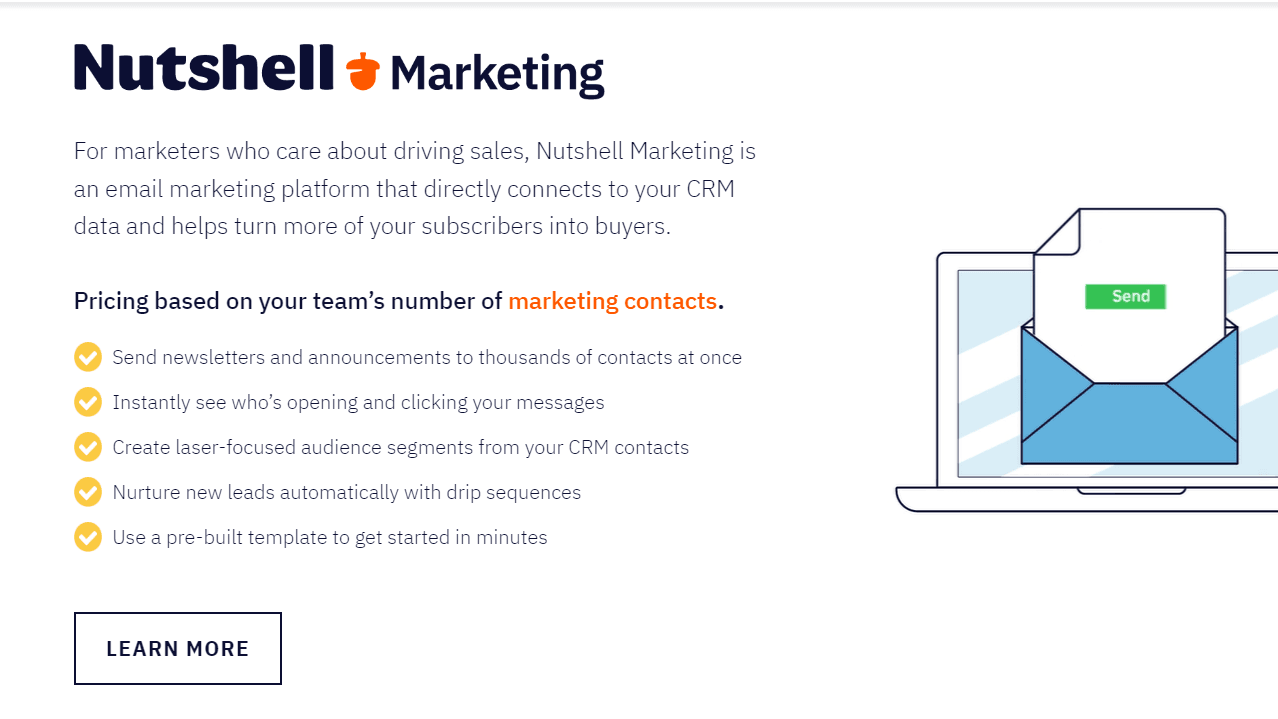
Here are some tips for getting the most from Nutshell CRM:
1. Create separate campaigns for each of your products or services.
This will help you track leads and make sure you don’t miss any opportunities.
2. Tag each lead with relevant keywords.
This will allow you to easily find them in future searches.
3. Use groups to organize your leads into categories (e.g., by industry or location).
This makes it easier to find specific leads when needed, and allows you to see how many leads are in each group at a glance.
4. Keep an eye on your sales pipeline.
This will show which prospects have been contacted, what their status is and what their next step should be.
Pricing
Nustshell plans and pricing are given below.
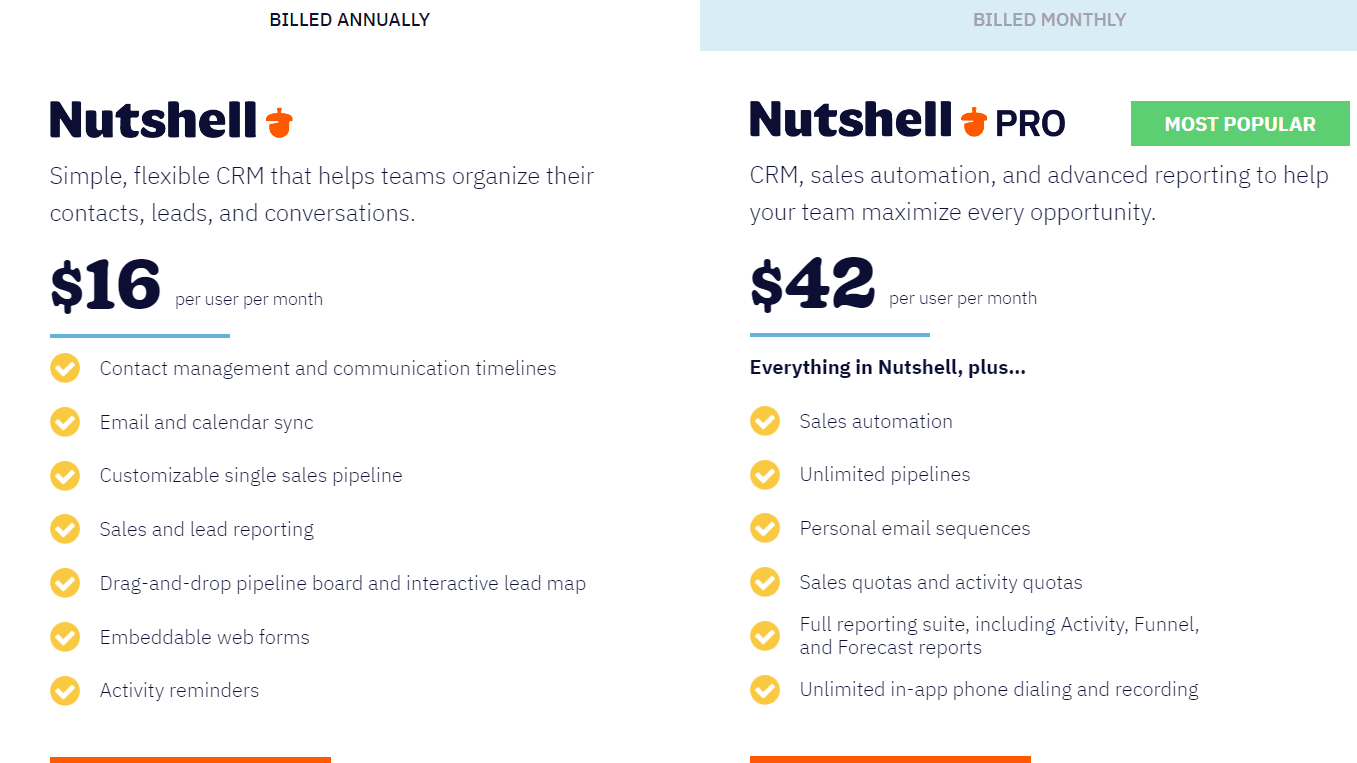
Starter Plan:
Starts at $16 per user per month. It provides the facilities of contact management, campaigns management, and reporting & analytics.
Pro Plan:
Starts at $42 per user per month. It includes the features like sales automation, unlimited pipelines, personal email sequences and unlimited in-app phone dialing and recording.
Marketing Plan:
Pricing is based on your team’s number of marketing contacts. It allows to: Instantly see who’s opening and clicking your messages, create laser-focused audience segments from your CRM contacts, and nurture new leads automatically with drip sequences.
#3. Zoho: Best for Personalized Lead Management

Zoho CRM is a cloud-based Customer Relationship Management (CRM) software.
It is designed to help businesses manage their sales, marketing and customer service teams.
Features
Zoho CRM is the best choice for personalized lead management. It is a comprehensive platform that helps you manage your leads and sales pipeline, create complex marketing campaigns, track customer satisfaction and engage with your customers at all stages of the buying cycle.
This CRM can help you organize your sales pipeline by tracking leads from prospecting to closing them down. You can also use this tool to create reports and measure the effectiveness of your lead generation campaigns.
It comes with features like-
- Customer Sales Force Automation: Create sales opportunities, track leads, build quotes, create contracts, close deals and many more.
- Sales Team Management: Create an organized sales team, assign tasks to each member of your sales team and stay updated with their progress through real-time reports.
- Marketing Campaign Management: Create personalized emails to send out to your customers using our email builder tool. You can also set up drip campaigns based on your customers’ behavior to increase your chances of getting them back on board.
- Customer Service Team: Manage all customer service activities including tracking tickets, assigning agents and monitoring their performance with reports and insights into their work patterns.
Pros and Cons of Using Zoho CRM Software
The Zoho marketing CRM software includes various pros and cons.
Pros:
Pros of using the CRM software are:
1. The software is very affordable.
You can get started for free, with upgrades available for a low monthly fee that includes access to all the features of Zoho CRM, as well as support and training from the company’s staff.
2. Zoho CRM is easy to use and navigate around.
The interface is intuitive and simple, making it easy for users of all skill levels to use the system without much training or support.
Cons:
Cons of using the software are:
1. Limited Customization Options.
You can only make some basic tweaks like changing colors and fonts but not much more than that.
2. You need multiple accounts to serve different customer bases.
If your business has more than one customer base, then you need to set up multiple accounts in the system.
How to Make the Best Use of Zoho CRM?
Here are some tips to help you get started with Zoho CRM:
Get familiar with the system –
Before implementing it in your business, make sure that you understand how it works and what each feature does. This will help you make better use of it in your business operations.
Set up user permissions –
Give access only to those users who need it so that they can manage their own tasks without interfering with others’ work. This will ensure that tasks are completed as per schedule without any delays or errors due to lack of knowledge about the system.
Create leads –
Leads represent potential customers who have expressed interest in buying a product or service from your company but have not yet made an actual purchase.
Pricing
The various plans of Zoho CRM are given below.

Free Plan Plan:
The free tier of Zoho CRM is available at no cost and includes basic contact management, lead capture, and sales tracking features.
Standard Plan:
This is Zoho’s most basic plan, which includes all the tools that small businesses need to manage their contacts and leads. It starts at $12 per user, per month.
Professional Plan:
This plan is meant for small-to-medium businesses that need more advanced features like email marketing automation, social media marketing and sales pipeline management. It starts at $20 per user per month.
Enterprise Plan:
This plan is designed for large enterprises and includes all the features of professional plan too. It starts at $35 per user per month.
Ultimate Plan:
The plan starts at $45 per user per month. This plan comes with all the benefits provided by the Enterprise plan and moreover, the features of the ultimate plan include Advanced BI-bundled with Zoho Analytics and a 30-day trial.
#4. Salesmate: Best Marketing CRM for Sales Teams
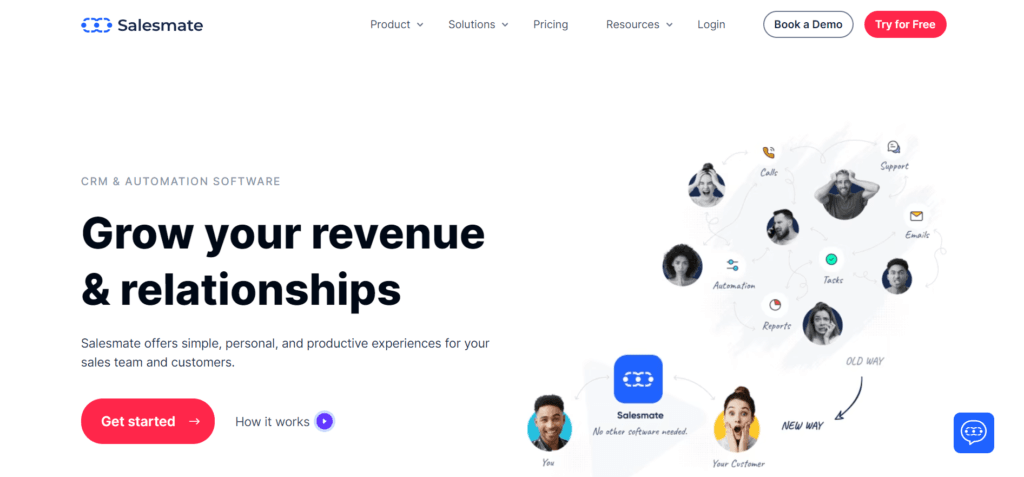
Salesmate CRM software is a cloud based customer relationship management (CRM) software. It’s a customer-facing sales and marketing platform that helps businesses manage leads, track prospects, and close more deals.
The Salesmate CRM system is built on top of the Salesmate platform, which already powers over 1 million sales professionals worldwide. The Salesmate CRM system is used by companies ranging from Fortune 500 businesses to startups.
Why Should You Choose Salesmate?
Salesmate is your best choice for a marketing CRM for sales teams. This software platform is designed to help you manage the entire sales process from prospecting to follow-up and everything in between.
With Salesmate CRM software, you can:
- Manage your entire pipeline in one place
- Track deals from start to finish
- Set up automated workflows for every stage of the deal lifecycle
- Stay organized with customizable dashboards
- Use integrations with hundreds of apps to get more done
Pros and Cons of Using Salesmate CRM Software
There can be various pros and cons of this CRM software. They are stated further:
Pros:
Advantages of using this CRM software are:
Easy Setup –
The installation process takes just a few minutes, thanks to our simple wizard driven setup. You can also import contacts from your existing email client or Salesforce account.
Seamless Integration –
Once you’ve installed Salesmate, you can connect it with other tools in your organization including MailChimp, Google Analytics and QuickBooks Online.
Real-Time Sync –
All data is synchronized automatically in real-time between all users (including mobile devices) so everyone has access to up-to-date information at all times.
Sales Dashboard –
Track your sales performance and see how each customer interacts with your company across each stage of the buyer journey. This includes notes on each interaction so you can remember details about each customer without having to keep notes manually anymore!
Cons:
Disadvantages of using this CRM software are:
It can be expensive.
While there are free options out there, most businesses will need to pay for the premium service if they want to take full advantage of what Salesmate has to offer.
It may not work well with other programs in your company.
If you use other popular systems like Zoho CRM, they may not integrate seamlessly with Salesmate and could cause problems when it comes time to move data around within your company.
You may need extra training.
Many people who have used Salesmate have found that they needed extra training on how to use certain parts of the software, including creating custom fields and reports as well as understanding how certain features work together (like sales pipelines).
How to Make the Best Use of Salesmate CRM?
Here are some tips on how to make the most out of Salesmate CRM:
- Make use of automation tools;
- Use Salesmate CRM as an event scheduler;
- Integrate with other tools like email marketing tools and payment gateways;
- Use Salesmate CRM as a sales pipeline;
- Set up your customer support team with Salesmate;
- Train your sales team on how to use Salesmate.
Pricing
The plans included in Salesmate marketing CRM software are:
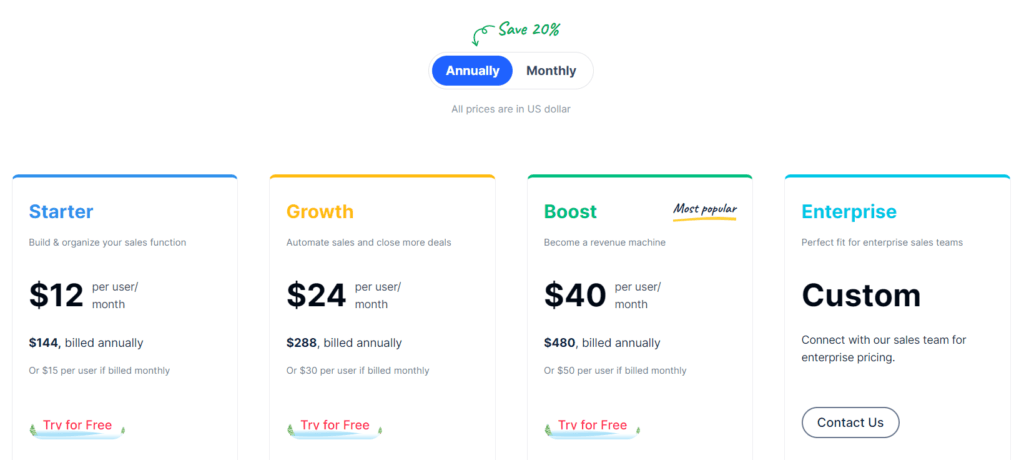
Starter Plan:
Starts at $12 per user/ month. Its features include: Email Sync, Tracking & Templates, Multiple Pipeline Management, Standard Dashboard & Reports, Workflow Management, and Built-in Calling & Text
Growth Plan:
Starts at $24 per user/ month. It provides with Product Management, Goal Management, Email Reminders & Scheduling, Team Inbox, and Custom Dashboard & Reports.
Boost Plan:
Starts at $40 per user/ month. It has the features of Power Dialer, Voicemail Drop, Smart Activity Queue, IP Restriction, and Increased Workflow & Sequence Limits.
Enterprise Plan:
This plan provides with the option of custom pricing i.e., based on the needs and requirements the price would vary. It provides you with dedicated account manager, personalized onboarding, priority support, dedicated instance, and unlimited dashboards.
#5. MailChimp: Best for Free Marketing Tools
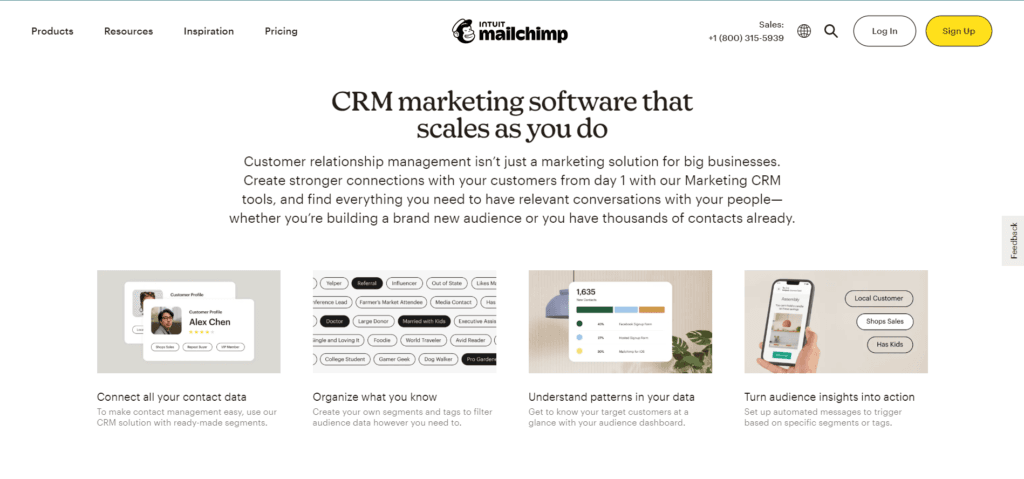
The MailChimp CRM software is a simple and easy to use solution for your business. It allows you to track all leads, manage your contacts and automate the process of sending marketing emails.
This MailChimp CRM software has been designed specifically for small businesses who want to automate their sales and marketing activities.
Features
MailChimp is the best free marketing tool for businesses of all sizes. It is a powerful email marketing solution that helps you create, send and track your emails. The best thing about MailChimp is that it offers you a free account which has all the features you need to start creating effective email campaigns right away.
This also offers paid plans so if you require more advanced features like automation, multiple user accounts etc., then you can upgrade to one of the paid plans.
The MailChimp CRM software comes with two main features:
1. Contact Tracking – This feature allows you to keep track of all your leads through their lifecycle (or journey) from signup to purchase. You can also see when they open your emails or click on links in them. This feature includes an email template designer so that you can create custom designs for each stage of their journey.
2. Automated Emails – If you are using MailChimp as your email marketing platform then this feature will help you send out automated messages based on specific events such as when a user signs up or purchases something from your store (via an affiliate link).
Pros and Cons of Using MailChimp CRM Software
There are several pros and cons of using MailChimp marketing CRM software. They are stated below:
Pros:
- You can easily create signup forms and capture email addresses from your website.
- It’s easy to segment your lists based on certain criteria such as location, purchase history or birthdays/anniversaries.
- You can easily track the click-through rate of your emails.
Cons:
- It is only available as a web-based application. This means that it won’t run on your computer or mobile device unless you have access to a web browser.
- The CRM does not have any phone support options available for customers who wish to speak directly with someone about their account questions or issues with their data entry process.
How to Make the Best Use of MailChimp CRM?
You can use the MailChimp CRM to:
- See which contacts have opened your emails, clicked on links, and unsubscribed from your list. This information can help you personalize future emails for those contacts and increase engagement.
- Use our advanced segmentation tools to target specific people based on their interests or past behavior. This can help you tailor your messaging to match what each person wants to see in their inbox.
- See the percentage of subscribers who are engaged with your campaigns—and which ones aren’t engaging with you at all. That way, you can stop sending them emails they won’t read or click through on.
- Find out when someone signs up for your email list or buys something from you—and then use that information in marketing automation workflows down the line (if you want).
Pricing
The plans that the MailChimp marketing CRM software include are discussed below.
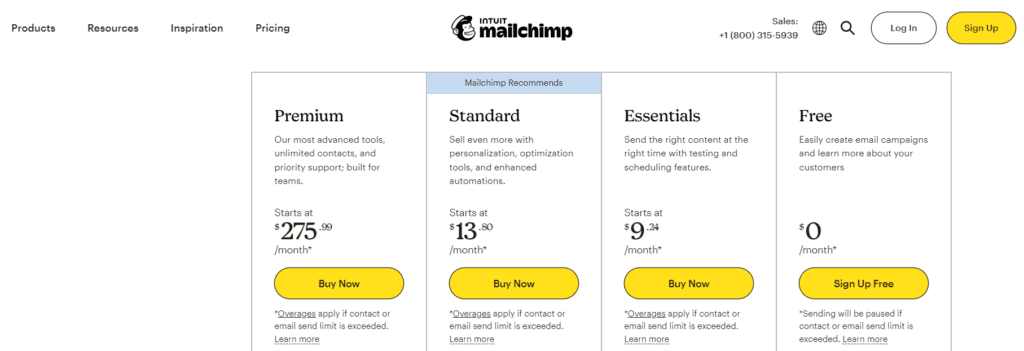
Free Plan
There is a free version of Mailchimp Marketing that provides the best features and multi-channel tools you need for your business. It provides best free tools when compared to other CRM software when it comes to marketing.
Essentials Plan
It starts at $9.24. This plan is great for email-only senders as it provides with around-the-clock-support.
Standard Plan
This plan starts at $13.80. It offers data-driven automation and optimization and intelligence tools for businesses that want a boost in their growth.
Premium Plan
The pricing start at $275.99. This plan is for the pros who need more advanced features and tools.
#6. ActiveCampaign: Best for Scaling Market via Automation
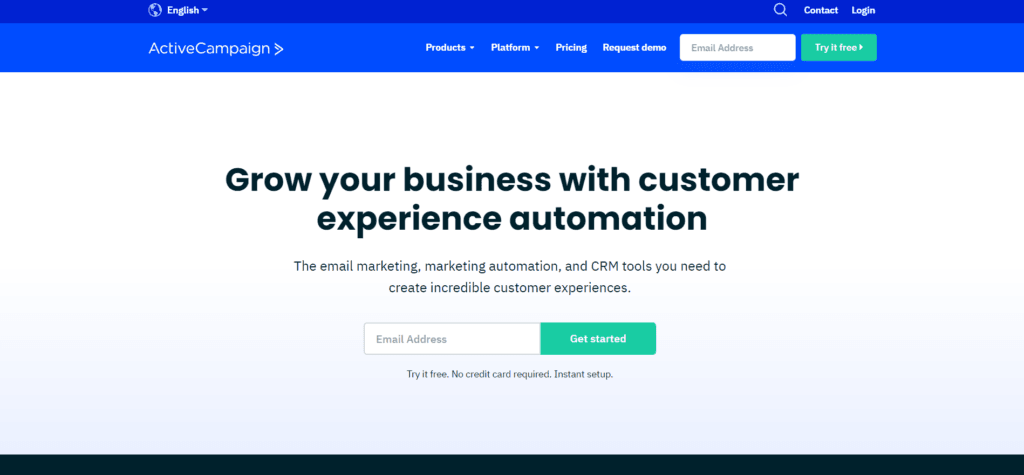
ActiveCampaign is a cloud-based marketing automation platform that offers a complete solution for small businesses, entrepreneurs and agencies. It’s designed to meet the needs of small businesses that don’t have the resources or expertise to create their own custom solutions.
Features
ActiveCampaign is one of the best CRMs on the market for scaling your business by automating your sales and marketing efforts. Here are five ways it can help:
- Automated Email Campaigns;
- Sales Funnels;
- Lead Generation;
- Customer Relationship Management (CRM);
- Marketing Automation.
The other significant features of the CRM software offers:
- Email Marketing Features: Email Autoresponders, Email Campaign Builder, Responsive Email Templates, Advanced Automation Rules, Lead Scoring, Mail Merge & More!
- Social Media Features: Facebook Ads Manager Integration, Twitter Ads Manager Integration & More!
- Analytics Features: Google Analytics Integration, Lead Reporting Tools & More!
- Lead Management Features: Web Form Builder, Lead Scoring System & More!
Pros and Cons of Using ActiveCampaign CRM Software
There are various pros and cons of using ActiveCampaign CRM software. They are stated below:
Pros:
- Easy to Use Interface – ActiveCampaign has a user-friendly interface that makes it easy for anyone in your team to quickly learn how to use the system. This includes salespeople, marketers and customer service reps alike so that everyone can be involved in managing customers through the CRM.
- Drag-and-Drop Forms – You can create forms using drag-and-drop tools so that you don’t have to spend hours creating them from scratch each time you need one. This saves time while making sure your forms look professional and are easy for customers to fill out on their own.
- Email Templates – You can create email templates that will automatically update with new information whenever someone opens up an email from you or clicks on a link.
Cons:
- The main disadvantage of using ActiveCampaign is the cost. It’s not a cheap software, and many people aren’t willing to spend thousands of dollars on marketing automation software.
- Another disadvantage is that it’s not as easy to use as other marketing automation software. There are no drag-and-drop features, so it takes more time to set up campaigns and manage subscribers.
- The third disadvantage of ActiveCampaign is that it doesn’t offer as many integrations as some other CRMs. You can integrate with MailChimp, but not with Salesforce or Zendesk.
How to Make Best Use of ActiveCampaign CRM?
Here are some tips for making the most of this marketing automation platform:
- Create a custom list for each client;
- Set up automated email sequences;
- Use segmentation to personalize your messages;
- Use tags to send targeted emails.
Pricing
There are majorly four plans for marketing CRM.
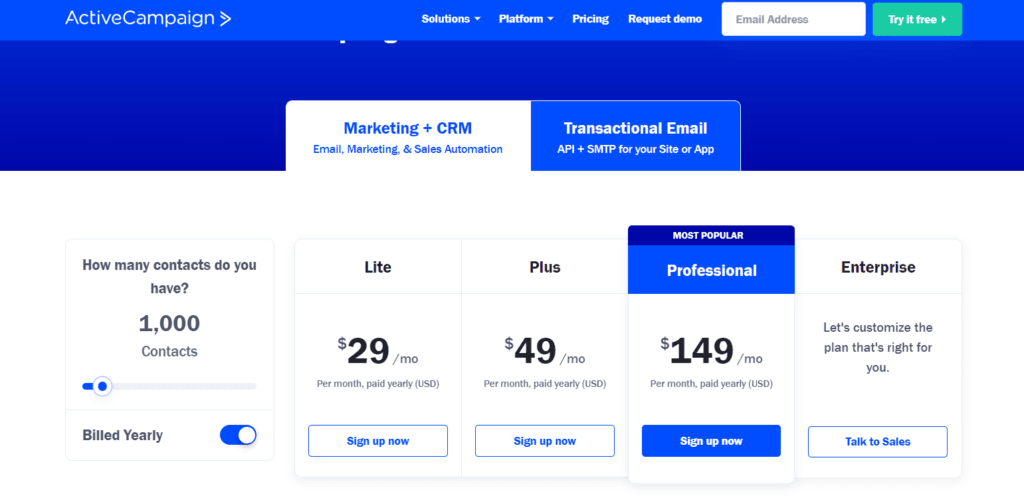
Lite Plan:
It starts at $29/mo and is the most basic plan provided by ActiveCampaign CRM.
Plus Plan:
It starts at $49/mo. The ActiveCampaign CRM Plus Plan is the most robust plan available. It includes all the features and functionality of the Lite Plan, plus more powerful lead scoring, sales reporting, and marketing automation capabilities that can help you grow your business.
Professional Plan:
The pricing starts at $149/mo. This plan includes all the features of the Plus plan and also provides with dynamic forms, advanced automation, unlimited contacts, and unlimited email tracking.
Enterprise Plan:
This is the plan that provides with customizations. The cost varies according to all the requirements you have.
#7. Pipedrive: Best Marketing CRM For Simplicity
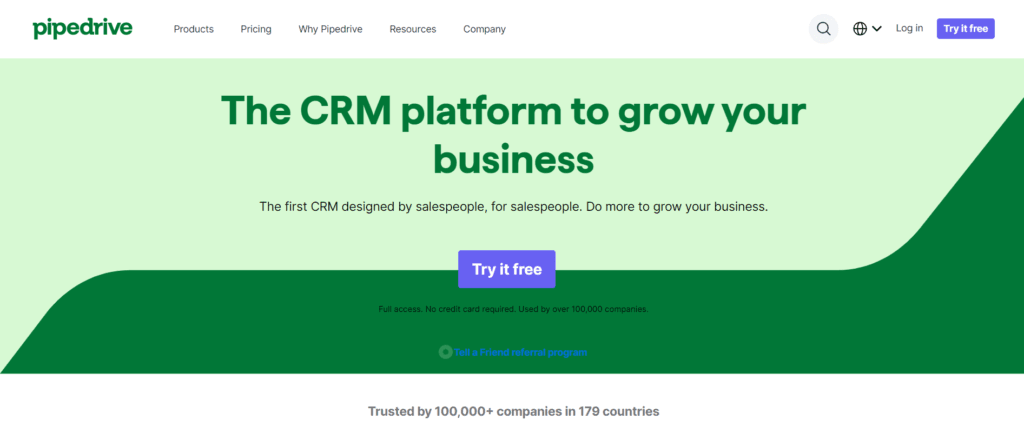
Pipedrive is a customer relationship management (CRM) software designed to help small and medium-sized businesses manage their sales and customer interactions. It provides a range of features to help sales teams organize and track their work, including a visual sales pipeline, task and calendar management, and email integration.
Features
Pipedrive Contract Management Software is the best in terms of its simplicity. It helps you to create contracts easily and keep them up-to-date.
The software is designed in such a way that it can be used by anyone who has good knowledge of computers and internet. Once you have installed the software on your computer, you can create contracts with ease.
Other significant features of Pipedrive:
- Sales Pipeline Management: Pipedrive provides a visual sales pipeline that allows sales teams to track and manage their deals at every stage of the sales process. This includes the ability to add custom fields and tags to deals, set reminders and alerts, and generate reports to track performance.
- Task and Calendar Management: Pipedrive includes a calendar and task management system to help sales teams prioritize their work and stay organized. It allows users to set deadlines, assign tasks to team members, and track progress.
- Email Integration: Pipedrive integrates with a range of email services, including Gmail, Outlook, and Exchange, allowing users to track and manage their email communication with customers directly from the platform. This helps sales teams to keep track of their communication with customers and ensure that they are following up on leads and opportunities in a timely manner.
Pros and Cons of Using Pipedrive CRM Software
Various advantages and disadvantages of using this marketing CRM software are:
Pros:
Pipedrive has three main benefits:
- Easy to set up and use
- It’s affordable
- It integrates with Salesforce
Cons:
There are three main cons of using Pipedrive marketing CRM software:
- It’s a feature-rich system with so many features that it can be difficult to figure out where to start.
- The interface is not very intuitive, especially when compared to other marketing CRM solutions like HubSpot.
- It takes some time to learn how to use the system effectively, which can slow down your productivity and cause frustration in the short term.
How to Make the Best Use of Pipedrive Marketing CRM Software?
There can be numerous ways to utilize the Pipedrive CRM.
With Pipedrive, you can:
1. Manage your sales pipeline:
Create leads, set up deals, track opportunities, manage contacts
2. Automate your prospecting:
Send emails, set up email templates, set reminders and follow-ups
3. Track deals and contacts:
Know who’s going to close the deal and when to reach out to them again.
Pricing
This CRM software comes with three major plans: Essential, Advanced and Professional. They are discussed below.
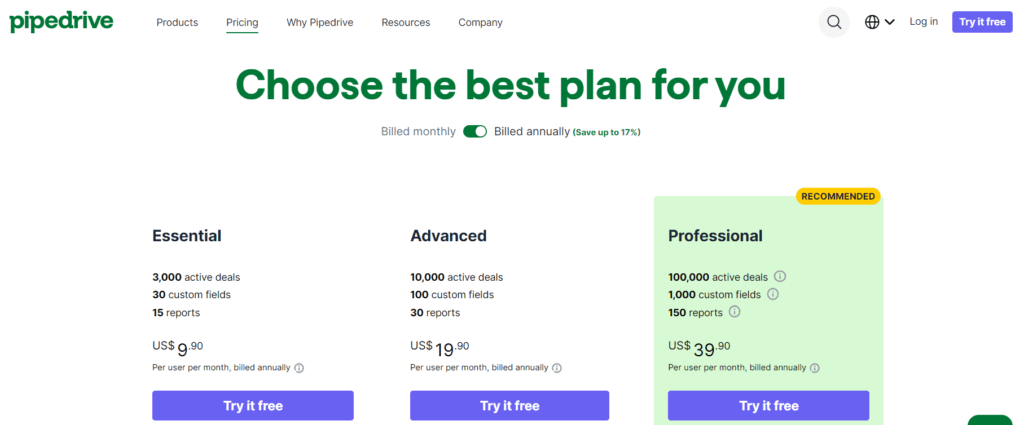
Essential Plan:
It starts at $9.90 per user per month and offers the facilities of 3000 active deals, 30 custom fields and 15 reports.
Advanced Plan:
It starts at $19.80 per user per month and has the features of 10 000 active deals, 100 custom fields and 30 reports.
Professional Plan:
It starts at $39.90 per user per month and allows 100 000 active deals, 1000 custom fields and 150 reports.
#8. Zendesk: Best for Boosting Conversions
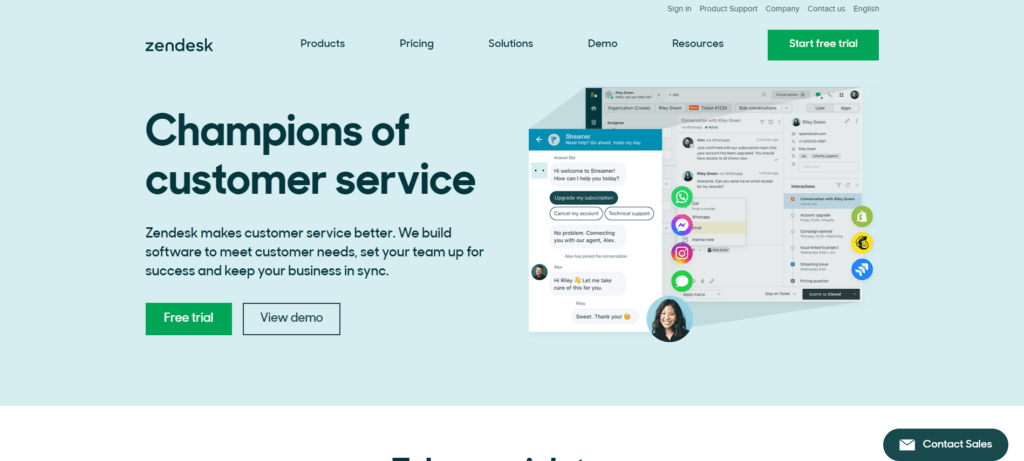
Zendesk is a customer relationship management (CRM) software that helps businesses and organizations to improve the customer experience, automate repetitive tasks and make their processes efficient. It provides a single platform for all customer communications, including email, chat and social media.
Features of Zendesk
Zendesk is a customer service software that’s designed to help businesses deliver an exceptional customer experience. It helps you keep track of your customers, manage all their conversations and sales, schedule appointments, and more.
If you’re looking for a better CRM to boost conversions, Zendesk provides the following functionalities:
- Email marketing automation;
- Social media management;
- Customer feedback surveys;
- Lead generation tools.
How to Make the Best Use of Zendesk Marketing CRM Software?
Some tips to make the best use of Zendesk marketing CRM software:
- Set up goals for each campaign so that you know what’s working and what isn’t.
- Use advanced search functions to find relevant information quickly and easily.
- Use the notes feature to keep track of important details about each lead or contact.
- Add tags to contacts so that you can group them by topic or project type for easy access later on down the line.
Pros and Cons of Using Zendesk Marketing CRM Software
Some of the pros and cons of using Zendesk CRM are stated below:
Pros:
A few pros of the CRM are:
- It’s easy to implement and use;
- It gives you real-time insights into your customers;
- It lets you manage every aspect of your business;
- It integrates with other apps seamlessly;
- It integrates with other apps seamlessly.
Cons:
Three cons of the software can be stated as:
- One of the biggest issues with Zendesk is the lack of customization options. While some companies may need more flexibility than others, most will find that they don’t have access to all the tools they need in order to customize their CRM software.
- Zendesk also doesn’t offer a lot of integrations with other third-party tools. While this isn’t always necessary, it can cause problems when you want to integrate your CRM with other systems like email marketing or social media management platforms.
- And finally, one of the biggest complaints about Zendesk is its user interface (UI). The UI can be confusing for new users and it may take some time before you learn how to navigate through the various pages and tabs within the system.
Pricing
There are several plans that Zendesk offers overall but when considering marketing CRM, we only have the Suite Enterprise plan.
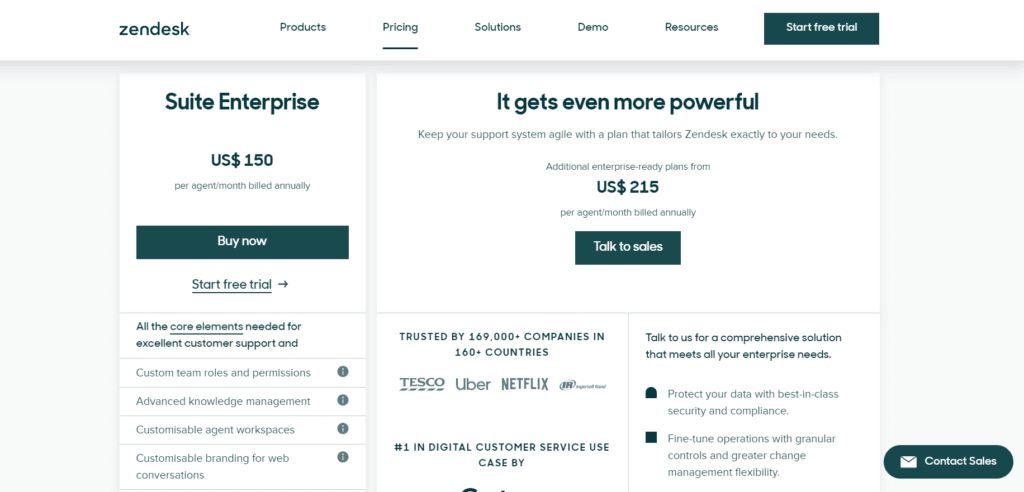
Suite Enterprise:
This plan starts at $150 per agent per month and is available for enterprises. It offers with all the facilities that an enterprise needs for boosting its conversions such as advanced knowledge management, custom team roles and permissions, and agent workspaces.
#9. SugarCRM: Best Marketing CRM Software for Experienced Users
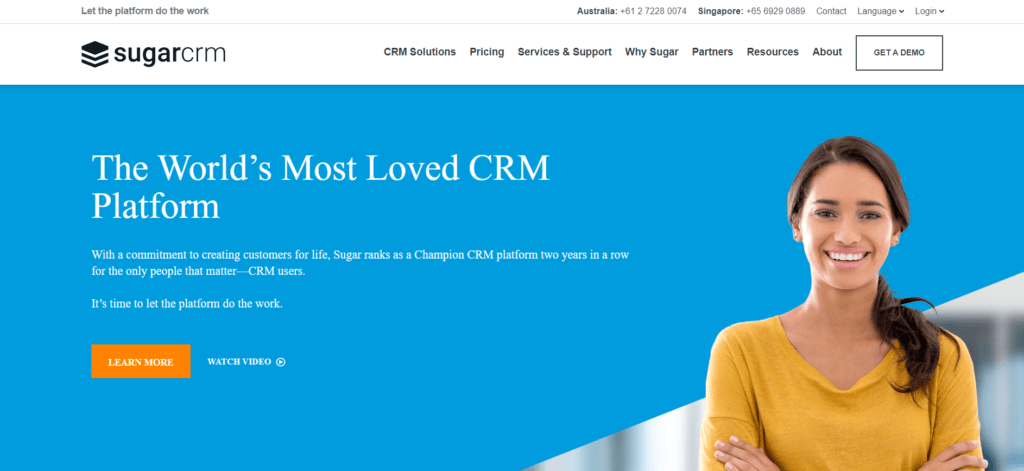
SugarCRM is a customer relationship management (CRM) software that helps companies manage their contacts, leads and customers more efficiently. The platform also offers a suite of other tools for marketing, sales and support teams.
SugarCRM can be used as a web-based SaaS application or installed on your own servers. It has a free trial available for those who want to try it out before deciding whether or not to purchase it.
Features
Most CRM software is designed to be user-friendly for beginners. However, this means that it will have limited functionality for experienced users. On the other hand, SugarCRM has a lot of features that can be used even by those who have used CRMs before.
For instance, you can create custom fields so you can store information in your database differently from other users. You can also customize reports so you get only what you need from them instead of having them all merged together into one report that includes everything from contacts to tasks and notes.
SugarCRM’s features include:
- Data modeling for data integrity;
- Data import/export tools;
- Multi-company support and multi-currency support;
- Email marketing automation capabilities;
- Marketing campaign management capabilities;
- Contact management and lead generation tools.
How to Make the Best Use of SugarCRM as Marketing CRM Software?
There are various ways in which you can use SugarCRM marketing CRM software.
You can get started by:
- Creating a new record, such as a lead or contact.
- Filling in the fields to describe that record, such as name, address, phone number and email address.
- Adding notes about the record to help you remember things later on.
- Connecting records together so that they will be grouped together in lists, charts and reports. For example, if you have an account that belongs to several customers and each customer has multiple contacts with different roles on the account, you can connect those accounts and contacts together so that they all appear under one listing in your list of accounts with contacts linked to them (in this case our Contacts list). This makes managing all these relationships much easier!
- Using our built-in search feature to find records quickly and easily through keywords or other criteria such as location or company name.
Pros and Cons
There are various pros and cons of using SugarCRM as your marketing CRM software:
Pros:
Two major advantages of this software:
Marketing Automation
SugarCRM enables you to track all customer interactions in one place and then use that information to automate follow-up emails or other marketing campaigns. This can save time and money by eliminating the need for manual tasks like sending out newsletters or reminders about upcoming events.
Visitor Tracking
Visitors don’t always convert into customers right away — sometimes it takes multiple visits before someone becomes a customer. By tracking visitor behavior on your website and using this data to segment visitors based on their actions, you can create personalized content that speaks directly to their needs and interests at each stage of the buyer journey. This will improve your conversion rate
Cons:
Two major disadvantages of this software:
Price –
While there is a free version of SugarCRM, it doesn’t have many features. If you want to use all of the features of the software, then you will have to pay for one of the paid plans. This can add up quickly depending on how many users you need to track.
Learning Curve –
SugarCRM is not simple to learn and use. There are many different functions that cannot be accessed until you reach certain levels in training or certifications because they are considered “advanced features”.
Pricing
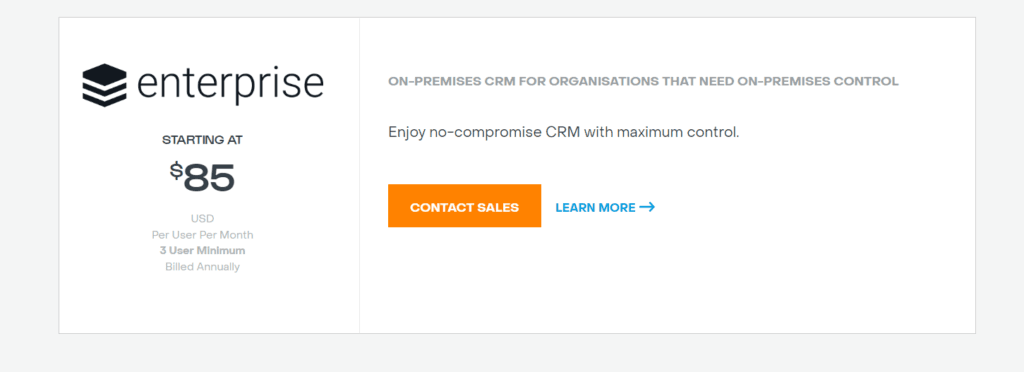
Enterprise Plan:
The pricing starts at $85 per user per month and provides all the features that an enterprise would need for the growth of their business. Some features are:
- Advanced reporting tools;
- Custom domains for your landing pages;
- Automated drip campaigns;
- Integrations with third-party tools like Zapier and IFTTT.
Wrapping it Up
While there are several marketing CRM software available to enhance your business, this comparison serves to compare the top options in the market and guide you towards the best marketing CRMs for your particular business needs. If you need any further help in optimizing your CRM, let’s set up a meeting and discuss how we can help.
Need help with your business growth? Send us an email at adhip[at]winsavvy.com or book a meeting for free here!
Read Next:
- 231+ Marketing Software and Tools for all your business needs and budgets
- Best All-in-one Marketing Software: Which one is right for your business needs?
- 9 best Account-based Marketing tools: Compared!
Author Bio: Isha Mudgal is part of WinSavvy’s editorial team. She hails from a tech background and writes predominantly on marketing and tech. Follow her on LinkedIn.





















